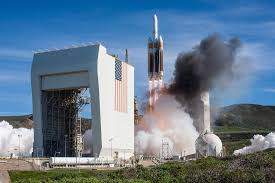United Launch Alliance: Combining the forces of two aerospace giants

The United Launch Alliance (ULA) is a joint venture between private space companies Lockheed Martin and Boeing that provides launch vehicles to NASA, the Department of Defense and other organizations. Headquartered in Denver, Colorado, ULA's rockets are among the largest and most powerful in the industry.
ULA was formed in 2006, and has since successfully delivered more than 100 satellites to orbit using the Atlas and Delta families of rockets, according to Boeing. The satellites help perform weather monitoring, Global Positioning System (GPS) navigation and aid in scientific research.
Lockheed Martin and Boeing are two aerospace companies that had previously been competitors for launch services to the U.S. government. The two companies joined in an equal partnership to form ULA in an effort to reduce costs, Spaceflight Now reported. The venture was started in response to Elon Musk's SpaceX, which had been undercutting its competitor's prices by developing reusable rockets.
SpaceX and ULA are now each other's main competitors for government launches, each having secured contracts for both scientific and national security missions. Musk has famously disparaged ULA in public, as recently as August 2020, tweeting that their rockets are "a complete waste of taxpayer money," CNBC reported.
ULA's rockets
ULA's line of rockets include the expendable Atlas V, Delta IV Heavy and the Vulcan Centaur, which is still under development.
Related: 'Behold Vulcan': Next generation rocket unveiled by United Launch Alliance
The Atlas rocket family has been a part of the military and aerospace industries' arsenal since the 1950s. The latest version, the Atlas V is often used to launch interplanetary missions and bring cargo to the International Space Station. It can carry up to 45,240 lbs. (20,520 kilograms) to low Earth orbit and 19,620 lbs. (8,900 kg) to higher orbits.
The Delta rocket family also stretches back to the early days of the Cold War space race. Its current workhorse is the Delta IV Heavy, which was the world's most powerful operational launch vehicle until 2018, when its title was snatched by SpaceX's Falcon Heavy rocket. The Delta IV Heavy can take 62,540 lbs. (28,370 kg) to low Earth orbit and 30,440 lbs. (13,810 kg) beyond.
When it becomes operational, Centaur will be able to launch 60,000 lbs. (27,200 kg) to low Earth orbit and 31,700 lbs. (14,400 kg) beyond, according to ULA. The Vulcan Centaur's maiden launch is expected in 2021, when it intends to send private space company Astrobotic's lunar lander to the moon.
What has ULA launched?
Here are some of ULA's most famous launches:
The Curiosity rover lifted off for Mars on an Atlas V on Nov. 26, 2011. Curiosity has rolled over the Red Planet's surface since 2012, discovering ample evidence that it was once warm and wet.The Juno spacecraft started its journey to Jupiter from an Atlas V on Aug. 5, 2011. The spacecraft is currently in orbit around the gas giant and has given researchers great insights into the planet's weather and interior.Other Atlas V space missions include OSIRIS-REx (Origins, Spectral Interpretation, Resource Identification, Security, Regolith Explorer), which successfully sampled asteroid Bennu in October 2020, the Lunar Reconnaissance Orbiter, the Solar Dynamics Observatory and the Mars InSight lander.Delta IV Heavy has mainly carried classified military missions since its debut in 2004. It has also launched the Orion capsule, which is expected to one day carry NASA astronauts. The Parker Solar Probe launched using Delta IV Heavy on Aug. 12, 2018. It has since flown extremely close to the sun and helped scientists better understand solar wind.
Photo: A United Launch Alliance Delta IV Heavy rocket carrying the classified NROL-71 spy satellite for the U.S. National Reconnaissance Office launches toward space from Space Launch Complex-6 at Vandenberg Air Force Base, California on Jan. 19, 2019.(Image: © United Launch Alliance)
Link: https://www.space.com/united-launch-alliance.html




